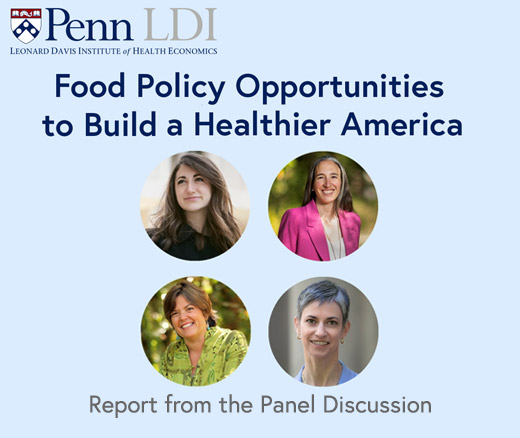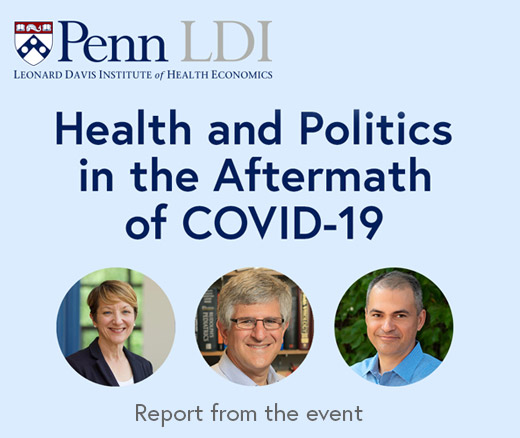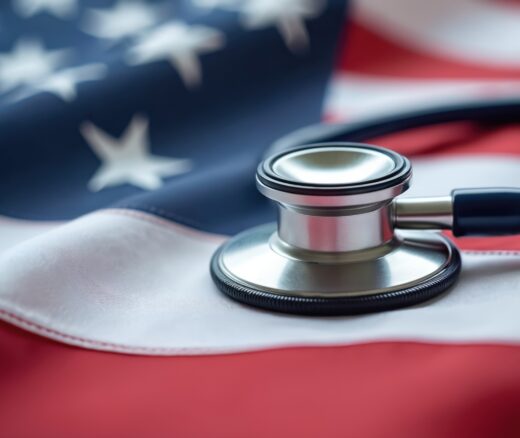
LDI Research Helped Shape Pennsylvania’s New Working Pennsylvanians Tax Credit
Pa.’s New Bipartisan Tax Credit is Designed to be Simple and Refundable – Reflecting Core Points From Penn LDI Researchers Who Briefed State Leaders
Population Health
Blog Post

Why were so many people in Philadelphia and across the United States hesitant to join a clinical trial for a potentially life-saving treatment during the global pandemic? Many factors are known to affect research participation, but in the face of COVID-19, one thing became clear: trust is essential.
In a recent study, LDI Fellows aimed to understand the dynamics affecting individuals’ willingness to contribute to scientific progress and public health security. David Yu, José Bauermeister, Karen Glanz, Antonia Villarruel, Stephen Bonett, and colleagues explored how trust in federal oversight of vaccine safety influenced people’s willingness to participate in COVID-19 clinical trials.
A series of surveys conducted among nearly 600 Philadelphia residents revealed the importance of fostering trust in federal systems to boost participation in public health research, particularly during crises. The researchers found that race, ethnicity, and gender were important predictors of COVID-19 trial willingness. Unlike in prior studies, they found that Hispanic and transgender or gender-diverse participants showed higher levels of interest in trial participation compared to non-Hispanic white and cis-gender women participants. Also, participants’ awareness of trial logistics and how to enroll increased their willingness to take part regardless of their level of trust for the government.
In the following Q&A, we discuss the study’s key insights with lead authors David Yu and Stephen Bonett.
Yu and Bonett: The COVID-19 pandemic threw the world into chaos, and suddenly, the race to find effective treatments became a matter of global urgency. Like many others, we watched as researchers and providers scrambled to navigate this unprecedented crisis, while everyone faced fear, uncertainty, and confusion.
Amid this whirlwind, we noticed a troubling pattern—despite the rapid development of vaccines and treatments, many people were (and still are) hesitant to participate in clinical trials. This hesitation was concerning because trials are crucial for ensuring that the treatments developed are safe and effective for everyone. But why were people so reluctant?
One key factor was trust—or rather, the lack of it. Trust in the institutions responsible for overseeing vaccine safety seemed to be eroding when it was more critical than ever. We began to wonder: How does this trust, or lack thereof, influence people’s willingness to participate in clinical trials? Could it be that people were not only wary of the virus but also of the processes designed to protect them?
This question felt particularly pressing in Philadelphia, where communities are diverse, and experiences with the health system vary widely. Understanding the dynamics of trust could be the key to addressing hesitancy and ensuring that everyone had a fair chance to contribute to—and benefit from—the scientific advances being made. So, we used data that we had been collecting as part of the PhillyCEAL (Community Engagement Alliance) initiative to better understand how trust in federal oversight affected willingness to participate in COVID-19 trials.
Yu and Bonett: We highlight several potential strategies:
Community-centered engagement: It’s crucial to engage directly with communities through partnerships with local leaders, organizations, and trusted figures. These individuals can convey information about vaccine safety and trials in a way that resonates with the community’s values and concerns.
Transparent and honest communication: Federal agencies and institutions need to communicate openly about the processes behind vaccine development and trials, including their safeguards to protect participants. This communication should include both the successes and challenges faced during these processes. When communities feel they are getting the full picture, trust can build.
Education and outreach: These efforts should be culturally responsive and tailored to the concerns of different communities. By delivering information that is accessible and relevant, researchers can help demystify the trial process and make it more approachable.
Yu and Bonett: Declining trust in public institutions can lead to increased vaccine hesitancy, which directly affects vaccine uptake. When people are skeptical of the institutions responsible for vaccine development, approval, and distribution, they are less likely to believe in the safety and efficacy of vaccines. Furthermore, if trust in institutions continues to decline, fewer people may be willing to participate in trials for new drugs and prevention strategies, slowing the research that responds to public health crises.
Yu and Bonett: We found that Hispanic/Latinx participants showed greater willingness to participate in COVID-related trials compared to non-Hispanic White participants. Transgender and gender-diverse individuals also showed more willingness to participate compared to cisgender women, while those who skipped the gender question were less willing. This contradicts previous research showing that people from racially minoritized communities and those identifying as transgender have faced barriers to participate in research. Our findings may suggest that these dynamics differed for COVID-19-related trials.
Yu and Bonett: We need to learn more about the specific mechanisms by which trust in governmental safety monitoring influences trial participation. Better understanding the social and psychological processes that influence people’s decisions to sign up for research would provide valuable insights into how to best integrate the idea of trust into conversations about inclusion in trials. Efforts to enhance this type of inclusivity would then need to be studied in greater depth.
For example, studying the impact of various messaging approaches on trust levels and recruitment rates could be a valuable next step. Finally, there were limitations to our study that future research could strengthen. Studies with larger and more systematic samples, longer follow-up periods, and more comprehensive measures all would be valuable. These studies also should aim to validate self-reported willingness with objective data about enrollment in trials.
The study, “The relationship Between Trust in Federal Oversight of Vaccine Safety and Willingness to Participate in COVID-19 Clinical Trials: A Repeated Measures Study of Philadelphia Residents (September 2021 – March 2023),” was published on July 31, 2024 in BMC Public Health. Authors include Hyunmin (David) Yu, José Bauermeister, Ufuoma Oyiborhoro, Knashawn Morales, Subhash Aryal, Karen Glanz, Antonia Villarruel, and Stephen Bonett.



Pa.’s New Bipartisan Tax Credit is Designed to be Simple and Refundable – Reflecting Core Points From Penn LDI Researchers Who Briefed State Leaders

Announcing Bold New Goals While Crippling the Infrastructure Needed to Achieve Them

Promising New Evidence and What’s Next

From 1990 to 2019, Black Life Expectancy Rose Most in Major Metros and the Northeast—but Gains Stalled or Reversed in Rural Areas and the Midwest, Especially for Younger Adults

A Penn LDI Seminar Focuses on Why They’re Important for the Future

Former Philadelphia Health Commissioner Warns That Gutting the CDC, Undermining Vaccines, and Politicizing Science Will Leave the U.S. Dangerously Unprepared for the Next Pandemic